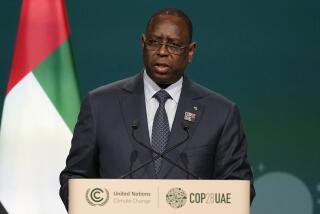Afghanistan Elections to Be Delayed at Least 3 Months
- Share via
NEW DELHI — Afghanistan’s first postwar democratic elections for president and parliament, originally set for June, will be delayed until at least September, interim President Hamid Karzai announced today.
“We are ready to manage both elections -- for the parliament and presidency -- in September,” Karzai told reporters at his palace in the Afghan capital, Kabul.
Karzai, who has said he will seek a five-year term, said U.N. officials told him that the presidential vote could be held in June or July, separate from the parliamentary poll. But the Afghan leader rejected that option.
In a meeting March 17 in Kabul with Secretary of State Colin L. Powell, Karzai said that elections might be postponed by a month or two. But recent fighting between factions that left scores dead in the western city of Herat, including the nation’s civil aviation minister, dashed any hope of holding the poll on time.
The United Nations is far behind in its effort to register more than 10 million voters. So far, only 1.6 million Afghans have put their names on the official voting list.
The U.N. also has struggled to get international donors to hand over promised funding for the registration drive. But insecurity in vast parts of the country is an even bigger obstacle.
In a report on Afghanistan’s instability released Wednesday, U.N. Secretary-General Kofi Annan cited the violence in Herat, ordinarily an island of stability amid Afghanistan’s turmoil, as one reason the election should be postponed.
“The report stresses in particular that more progress is required to disarm, demobilize and re-integrate former combatants,” U.N. spokesman Manoel de Almeida e Silva told reporters in Kabul on Thursday. “Fighting in Herat and recent factional fighting in the north were serious recent indications that security remains an unsolved problem.”
More than 5,000 North Atlantic Treaty Organization peacekeepers are in Afghanistan, but are concentrated in the capital. The alliance has attempted to bring stability beyond Kabul by deploying teams of troops to do development work, such as building schools.
More than 10,000 U.S. troops are also in the country, and 2,000 Marines are to join them soon, but they are largely focused on the hunt for fighters from the former Taliban regime and their Al Qaeda allies. Meanwhile, vast swaths of countryside are largely at the mercy of warlords, robbers and guerrilla insurgents.
The new Afghan National Army, which is expected to take on increasing responsibility for the country’s security, has suffered from a high dropout rate.
More to Read
Sign up for Essential California
The most important California stories and recommendations in your inbox every morning.
You may occasionally receive promotional content from the Los Angeles Times.













